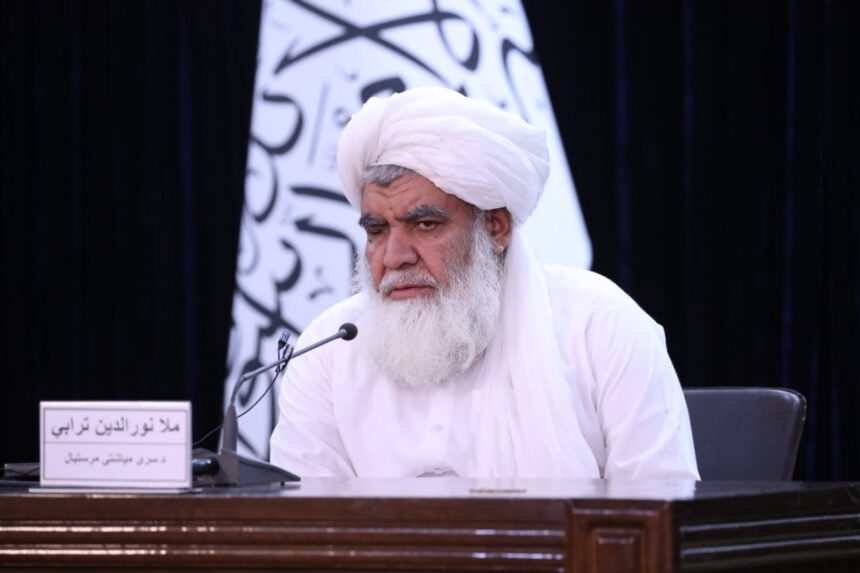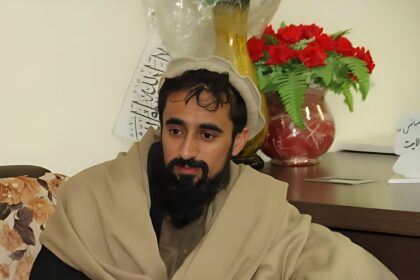RASC News Agency: In a defiant and revealing statement, Nooruddin Turabi, a senior Taliban-appointed official overseeing disaster management, lashed out at the international community for making the recognition of the Taliban regime conditional upon human rights guarantees particularly women’s rights and the establishment of an inclusive government. The remarks reflect not only the Taliban’s persistent defiance of global expectations but also the group’s deepening isolation as it continues to flout even the most basic international norms. Speaking to a local television channel, Turabi claimed without evidence that key issues such as girls’ education, women’s right to work, and political inclusivity were never part of the Doha negotiations between the Taliban and Western representatives. In a statement that blatantly distorts reality, Turabi insisted that the Taliban had already formed an “inclusive cabinet,” despite overwhelming international assessments describing their administration as an ethnically monolithic and ideologically rigid regime dominated exclusively by Pashtun loyalists.
All credible global reports, including those from the United Nations and major rights organizations, underscore that the Taliban’s leadership structure is devoid of genuine diversity or national representation. Rather than embracing pluralism, the Taliban have cemented a system of exclusion rooted in ultraconservative ideology and ethnic hegemony that systematically sidelines non-Pashtun communities and political dissidents. Turabi went on to question the international community’s timing in raising the issue of women’s rights. “If education for girls was so important,” he asked, “why didn’t they recognize us back then?” His rhetorical deflection ignores the well-documented reality that the Taliban’s assault on women’s rights began immediately after their return to power. Within days, girls were barred from secondary and higher education, women were purged from most professional sectors, and an all-male moral police force was unleashed to police women’s dress and behavior in public.
Far from being a post-facto demand, the issue of women’s rights lies at the heart of the international community’s refusal to legitimize the Taliban’s de facto rule. The group’s unrelenting crackdown on female education and employment has been widely condemned as a form of gender apartheid and one of the gravest reversals in global human rights in recent decades. Turabi also claimed, again with no credible evidence, that various ethnic groups including Tajiks, Uzbeks, and Baloch are represented in the Taliban’s governing structure. He drew misleading parallels between the Taliban’s appointed government and democratic systems based on elections. This comparison collapses under scrutiny: unlike democratic governance, the Taliban’s system offers no electoral process, no popular legitimacy, and no constitutional mechanisms for accountability. Ethnic minorities, where present, occupy only symbolic or powerless positions, often as window dressing to deflect international criticism.
He further asserted that matters such as women’s rights, counterterrorism, and narcotics trafficking are “internal affairs” and should not be the concern of the global community. This statement glaringly ignores the transnational consequences of Taliban misrule. Over the past two years, Afghanistan has become a nexus of human rights violations, an epicenter of jihadist recruitment, and a major hub for narcotics trafficking all developments that directly threaten regional and international stability. Despite Turabi’s claim that the Taliban remain open to dialogue with Western governments for recognition, he reiterated the group’s non-negotiable stance that such engagement must be “unconditional.” This inflexible posture underscores the Taliban’s outright dismissal of basic diplomatic principles, including adherence to international law, the protection of civil liberties, and inclusive governance. Their demands for recognition absent reform effectively amount to a request for a free pass to oppress their own population without scrutiny.
In an especially audacious section of his remarks, Turabi invoked the U.S.-Taliban Doha Agreement, claiming that no concessions on Islamic or national values were made during the talks and lamenting that the only unfulfilled aspect was the removal of Taliban leaders from international sanctions lists. However, U.S. officials have repeatedly emphasized that the Taliban have flagrantly violated their commitments under the deal including their promise to prevent Afghanistan from becoming a safe haven for terrorist groups and to initiate meaningful intra-Afghanistan dialogue. Contrary to Taliban denials, numerous international observers argue that the Doha Agreement has been enforced asymmetrically: while the Taliban have benefited from U.S. military withdrawal and diminishing international pressure, they have reneged on every political, security, and human rights obligation in the accord. Instead of fostering peace or inclusivity, the agreement inadvertently enabled the Taliban’s brutal consolidation of power.
Notably, the Taliban’s own spokesperson recently stated that the Doha Agreement “no longer serves as the group’s operational framework,” yet another signal of the Taliban’s erratic and duplicitous approach to international diplomacy. This posture continues to erode what little credibility the group retains on the global stage, further isolating Afghanistan under a regime that appears intent on replicating the worst authoritarian impulses of its past.






